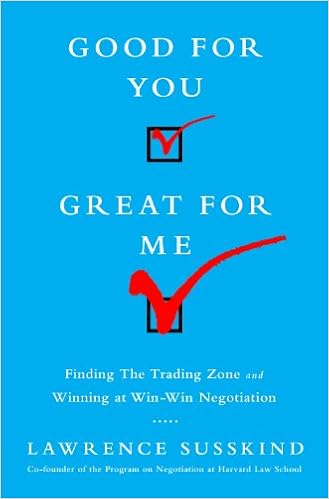On April 30th and May 1st, I offer a two day training program called Dealing with An Angry Public (www.pon.execseminars.com). Along with my Harvard Business School colleague Michael Wheeler and Jeff Ansell, a well known Canadian journalist and media consultant, we show how a consensus building approach can be used to reshape interactions with various publics that are angry with you -- either because of what you have done, what you propose to do or what you stand for. Most of what passes for media training in such situations focuses on getting the right message across. We teach how to go beyond that and interact with angry publics by (1) acknowledging the concerns of the other side; (2) encouraging joint fact finding; (3) offering contingent commitments and promising to compensate unintended but knowable impacts; (4) accepting responsibility, admitting mistakes and sharing power; (5) acting in a trustworthy fashion at all times; and (6) focusing on building long-term relationships.
Sunday, March 22, 2009
Dealing with an Angry Public
Posted by Lawrence Susskind at 5:13 AM 1 comments
Labels: angry publics, crisis communication, multiparty negotiation, values-based disputes
Sunday, March 15, 2009
Why Would Anyone Bother to Cooperate?
In his new book, Free Riding, Richard Tuck challenges long-standing views about social cooperation. Free riding, as most people know, involves decisions that many of us make not to get involved in group efforts because we can see that the outcome will probably be the same whether or not we participate, and we will reap the benefits in any case.
Posted by Lawrence Susskind at 5:17 AM 1 comments
Labels: free riding, incentives to cooperate, managing the commons, tragedy of the commons
Wednesday, March 4, 2009
Ethnic and National Reconciliation
I can remember a moment when it seemed impossible that certain groups or nations could ever reconcile: East and West Germany, North and South Vietnam, North Ireland and England, black and white South Africa, Hutu and Tutsi in Rwanda. Today, it seems equally implausible that North and South Korea, Tibet and China, Israel and Palestine, or Suni and Shia in Iraq will ever reconcile. Yet, we should remember that the ruined relationships that seemed impossible to repair not so long ago were dramatically transformed. The question is, "How did that happen?"
Posted by Lawrence Susskind at 10:52 AM 1 comments
Labels: co-existence, ethnic conflict, international conflict, reconciliation




